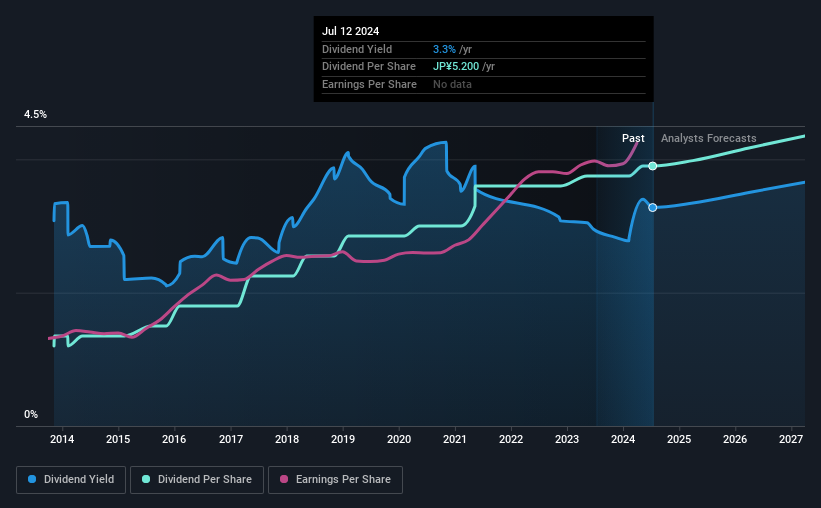- Japan
- /
- Telecom Services and Carriers
- /
- TSE:9432
Nippon Telegraph and Telephone (TSE:9432) Is Due To Pay A Dividend Of ¥2.60

Nippon Telegraph and Telephone Corporation (TSE:9432) will pay a dividend of ¥2.60 on the 18th of December. This makes the dividend yield 3.3%, which is above the industry average.
View our latest analysis for Nippon Telegraph and Telephone
Nippon Telegraph and Telephone's Dividend Is Well Covered By Earnings
We like to see robust dividend yields, but that doesn't matter if the payment isn't sustainable. Before making this announcement, Nippon Telegraph and Telephone was paying a whopping 151% as a dividend, but this only made up 34% of its overall earnings. A cash payout ratio this high could put the dividend under pressure and force the company to reduce it in the future if it were to run into tough times.
Over the next year, EPS is forecast to expand by 3.5%. If the dividend continues on this path, the payout ratio could be 37% by next year, which we think can be pretty sustainable going forward.

Nippon Telegraph and Telephone Has A Solid Track Record
Even over a long history of paying dividends, the company's distributions have been remarkably stable. Since 2014, the annual payment back then was ¥1.60, compared to the most recent full-year payment of ¥5.20. This implies that the company grew its distributions at a yearly rate of about 13% over that duration. It is good to see that there has been strong dividend growth, and that there haven't been any cuts for a long time.
The Dividend Looks Likely To Grow
Some investors will be chomping at the bit to buy some of the company's stock based on its dividend history. It's encouraging to see that Nippon Telegraph and Telephone has been growing its earnings per share at 12% a year over the past five years. With a decent amount of growth and a low payout ratio, we think this bodes well for Nippon Telegraph and Telephone's prospects of growing its dividend payments in the future.
Our Thoughts On Nippon Telegraph and Telephone's Dividend
Overall, this is probably not a great income stock, even though the dividend is being raised at the moment. While Nippon Telegraph and Telephone is earning enough to cover the payments, the cash flows are lacking. We would probably look elsewhere for an income investment.
Investors generally tend to favour companies with a consistent, stable dividend policy as opposed to those operating an irregular one. However, there are other things to consider for investors when analysing stock performance. Taking the debate a bit further, we've identified 2 warning signs for Nippon Telegraph and Telephone that investors need to be conscious of moving forward. Looking for more high-yielding dividend ideas? Try our collection of strong dividend payers.
Valuation is complex, but we're here to simplify it.
Discover if Nippon Telegraph and Telephone might be undervalued or overvalued with our detailed analysis, featuring fair value estimates, potential risks, dividends, insider trades, and its financial condition.
Access Free AnalysisHave feedback on this article? Concerned about the content? Get in touch with us directly. Alternatively, email editorial-team (at) simplywallst.com.
This article by Simply Wall St is general in nature. We provide commentary based on historical data and analyst forecasts only using an unbiased methodology and our articles are not intended to be financial advice. It does not constitute a recommendation to buy or sell any stock, and does not take account of your objectives, or your financial situation. We aim to bring you long-term focused analysis driven by fundamental data. Note that our analysis may not factor in the latest price-sensitive company announcements or qualitative material. Simply Wall St has no position in any stocks mentioned.
Have feedback on this article? Concerned about the content? Get in touch with us directly. Alternatively, email editorial-team@simplywallst.com
About TSE:9432
Nippon Telegraph and Telephone
Operates as a telecommunications company in Japan and internationally.
Undervalued average dividend payer.
Similar Companies
Market Insights
Community Narratives



